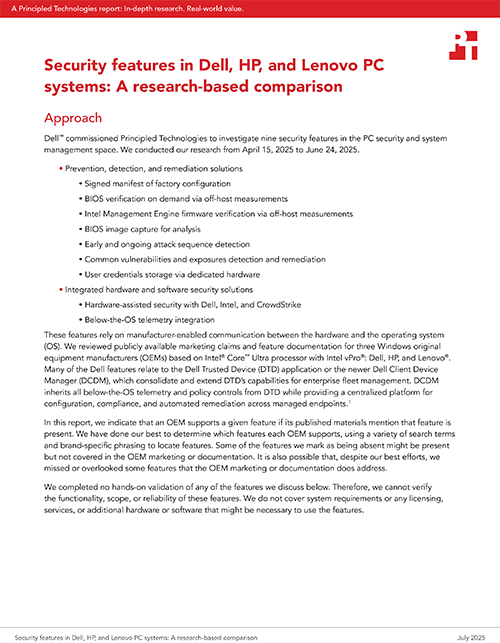
In just a few short years, the number of remote and hybrid workers has multiplied exponentially—permanently shifting work patterns across many industries. In response, many businesses have encountered the challenges of supporting remote work infrastructure on a scale they may not have considered before 2020. For the decision-makers who carry the responsibility of selecting PCs for enterprise deployment in remote contexts, system-level and fleetwide security management features can be a major priority.
We researched publicly available marketing claims and documentation to find out the extent to which three Windows original equipment manufacturers (OEMs)—Dell, HP, and Lenovo—supported nine specific PC security and system management features. We focused our research on the features that each vendor supports within two general categories: 1) prevention, detection, and remediation; and 2) integrated hardware and software security solutions. In the first group, we investigated BIOS verification and image capture capabilities, Intel Management Engine verification, attack detection, vulnerability detection, automated remediation, and more. In the second group, we examined hardware-assisted security and below-the-OS telemetry integration.
Based on what we found in each OEM’s publicly available documentation, Dell supported all nine of the security and management features we investigated. HP fully supported one feature and partially supported two, and Lenovo fully supported one feature and partially supported another. For companies that want to equip their remote workforce with capable endpoint hardware while feeling confident that their assets, networks, and infrastructure will be well-protected against a variety of threats, Dell PCs may be a great option for their next fleet deployment.
To read about our PC security and system management feature comparison study in more detail, check out the report below.
Principled Technologies is more than a name: Those two words power all we do. Our principles are our north star, determining the way we work with you, treat our staff, and run our business. And in every area, technologies drive our business, inspire us to innovate, and remind us that new approaches are always possible.






